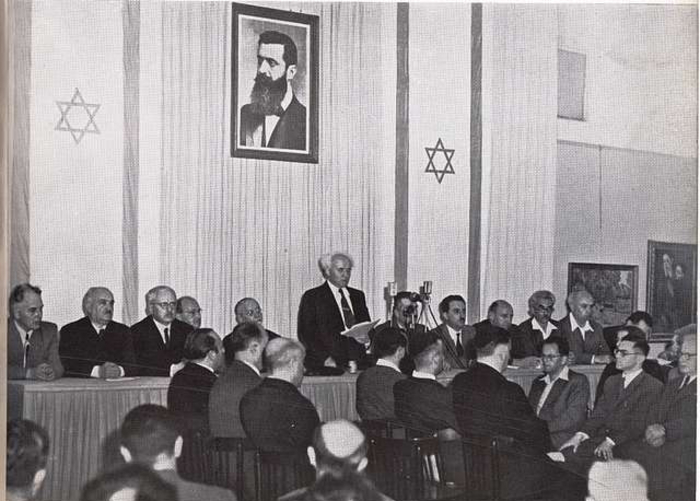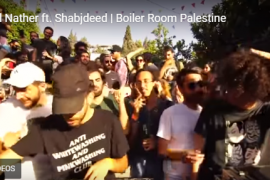A Guardian op-ed by veteran Palestinian politician Mustafa Barghouti on May 15th commemorates the 75th anniversary of what Palestinians call the Nakba (“A just and democratic society that benefits all: that’s what Palestinians are fighting for”). The 15th of May, in 1948, is the date on the Gregorian calendar when Israel declared its independence.
Though Palestinians are ostensibly mourning the flight of hundreds of thousands of Palestinians during the 1948-49 war on ‘Nakba Day’, it’s really about lamenting the ‘catastrophe’ of Israel’s existence – the fact that Arab armies failed, a mere three years after six million Jews were murdered by the Nazis, to destroy the nascent Jewish state.
Barghouti uses his Guardian platform to advocate for the delusion known as the ‘one-state solution’ – that is, the end of the world’s only Jewish state. In so doing, he attempts (as so many Palestinian leaders do) to undermine the legitimacy of Israel by engaging in a historical lie: suggesting that Jews don’t have a connection to the land, framing them as colonialists who replaced the “indigenous Palestinian population”.
Further, like so many Palestinian figures who’ve contributed to the outlet before him, such as Mahmoud Abbas, Barghouti’s efforts to sell readers on the cause include the risible claim that Palestinian leaders have made extremely generous concessions for peace:
In 1993, the leadership of the Palestine Liberation Organisation (PLO) accepted the creation of a state on only 22% of historic Palestine. But, as we have learned bitterly through the experience of the Oslo Accords, the compromise of Palestinians has not improved the situation for our people.
Thirty years after signing the Oslo agreement between the PLO and Israel, the “two-state solution” is dead because of Israel’s continuous colonisation and de-facto annexation of Palestinian land.
The lie is many fold, beginning with the claim that Palestinians magnanimously accepted a state on only “22% of historic Palestine”
First, there was never, at any point in history, a sovereign Palestinian state, and Palestinian national identity (as a unique nationalist movement separate from Arab or tribal identities) is only a 20th century phenomenon.
The implicit contention, that a potential Palestinian state in the West Bank, east Jerusalem and Gaza would only represent 22% of ‘their historical homeland’, suggests that the entire land, from ‘the river to the sea’, is rightfully theirs. The truth is, however, that Israel has conceded most of their “historic land” as promised to them by the 1922 Mandate for Palestine – arguably the earliest modern legal codification of an area known as “Palestine”.
As the map below by Shany Mor shows, Palestinian political control of the land since 1946 (or, for that matter, since the beginning of time) was zero, but now (because of Israeli concessions and territorial withdrawal) encompasses all of Gaza and major population centers in the West Bank.

Palestinians didn’t ‘lose’ 78% of their land for the simple reason that you can’t ‘lose’ land you never had control of in the first place. Let’s recall that Arab leaders rejected the UN-sanctioned partition of the land in 1947, which would have created a Palestinian Arab state.
Barghouti’s claim that Palestinian leaders are the ones who made concessions, and that Israel killed the two-state solution, is the opposite of the truth. The PA leadership rejected, on three occasions, in the 2000s, Israeli peace offers which would have created – again,for the first time in history – a contiguous, sovereign Palestinian state. The Israeli offers to Arafat and Abbas respectively included roughly 95% of the West Bank and all of Gaza, with a Palestinian capital in east Jerusalem.
Barghouti even decries what he calls Israel’s “segregation wall”, the security barrier built in response to the scores of Palestinian suicide bombings of the 2nd intifada.
But, of course, Palestinian leaders and their advocates can never so much as acknowledge the savage violence of that time – which broke out, it should be stressed, during the height of Oslo – that traumatised a generation of Israelis, rendering them far more skeptical of Palestinian intentions. To admit the colossal moral and strategic mistake of the five year campaign of terror would require conceding their role in the death of the ‘peace process’.
However, it’s a profound understatement to say that the culture of self-reflection, self-criticism and reform that’s required to achieve concrete goals in the real world has never been Palestinian leaders’ strong suit. The ‘Nakba’ narrative, with its belief in the intrinsic injustice of the Zionist cause on one hand, and the inherent righteousness and victimhood of Palestinians on the other, represents a cognitive and political recipe for a future of bad outcomes.






The UK leader in woke – turning facts on their head.